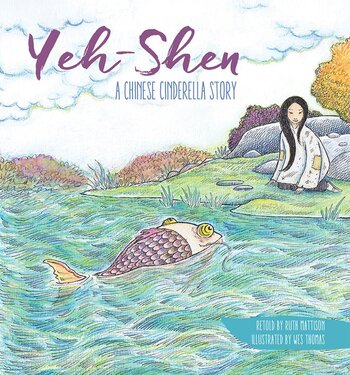
Yeh-Shen (or Yè Xiàn; 葉限/叶限) is a Chinese Fairy Tale known to be one of the oldest variations of "Cinderella". The story first appears in Miscellaneous Morsels from Youyang ("酉阳杂俎"; Youyang za zu) by Duan Chengshi around 850 AD, in the late Tang Dynasty.
Ye Xian (or Yeh-Shen) is the daughter of a scholar with two wives, when her mother and then her father die from a local plague, Ye Xian is forced to become a lowly servant and work for her father's other wife (Ye Xian's stepmother), Jin, and her half-sister, Jun-Li. She is soon overjoyed to find her mother reincarnated as a large fish in a nearby lake watching over her, though learning of this the stepmother has the fish captured and served to herself and her own daughter.
Ye Xian collects the bones and is told by a spirit to place them at each foot of her bed, and she will be granted wishes if she requests them of the bones. Soon the Spring Festival begins, and Ye Xian is told to stay and clean by her stepmother. A spirit, however, tells her where to discover some clothes to wear to the festival. She goes to the festival and enjoys herself until she needs to leave to avoid discovery by her stepmother. She leaves behind a golden slipper which is discovered by a King who resolves to discover the owner. He eventually does so taking her as his wife to her joy, and leaving the stepmother and daughter behind.
Donna Jo Napoli's young adult novel Bound is a retelling of this story. The story later became familiar with modern audiences as an animated adaptation on CBS Storybreak. Titled Yeh-Shen: A Cinderella Story from China, the story originally aired in April 1985 and was narrated -– in its original airing -– by Bob Keeshan (formerly Captain Kangaroo). Ten years later, The Puzzle Place retold the story in the episode "Going by the Book".
Yeh-Shen features these tropes:
- Alpha Bitch: Jin and Jun-Li, Yeh-Shen's stepmother and stepsister.
- Jin is a bitter woman whose physical appearance deteriorated through years of hard work.
- Jun-Li is completely spoiled and lazy, and her hateful jealousy is fuelled upon realizing she does not have the same gifts or virtues as Yeh Shen.
- Ambiguous Gender: Probably not intentionally so, but whether the fairy is male or female is lost in translation, even to modern Chinese. One Chinese picture book from the 1950s notably divides the being into two fairies
 , one male and one female. English translations nearly always make the character male, implying him to be an incarnation of her dead father.
, one male and one female. English translations nearly always make the character male, implying him to be an incarnation of her dead father. - Beauty Equals Goodness: Yeh-Shen, the beautiful heroine. It's reversed with Jun-Li, who is said to be far less than beautiful and completely amoral.
- Cheaters Never Prosper: Many ways by Jin and Jun-Li. First, Jin — perhaps sensing that Yeh Shen is more beautiful than Jun-Li, and thus will get the most desirable, richest man — bans Yeh Shen from going to the festival to meet a potential suitor, but it fails to stop Yeh Shen from going. Later, when Yeh Shen is revealed (in Jin's presence) to be the owner of the golden slipper (left behind at the festival), Jin appeals to the king that the slipper had been stolen from another maiden, but the king is neither fooled nor amused and has both Jin and Jun-Li banished from the kingdom. (In the end, these cheaters get their just deserts, being crushed to death when their cave is demolished in an earthquake.)
- Death by Origin Story: Yeh Shen's real parents.
- Fairy Godmother: The fairy who reveals the bone's magic to Yeh Shen seems to be the precursor to Cinderella's fairy godmother.
- Kick the Dog: Both Jin and Jun-Li have the Golden Fish butchered and served as a meal for themselves. Why? It's because the Golden Fish is the Reincarnation of Yeh-Shen's dead mother, and Jin and Jun-Li had it killed purely to deprive Yeh-Shen of any form of happiness in her life.
- Lost in Translation:
- The story opens saying that Yeh-Shen's father had two wives. While this is usually translated to imply he was in a polyamorous marriage with Yeh-Shen's real mother and stepmother, it's possible this was meant to mean "he was married twice".
- Yeh-Shen's father is described as a cave chief. Since the text suggests Yeh-Shen's family lives in a house, complete with a garden, it's been suggested that this means he is the chief of a mountainous region, not literal cave-people.
- The stepmother and stepsister ultimately die by "flying stones". Whether this means they died in a rock slide or the king ordered them stoned to death is up for debate.
- Parental Favoritism: Jin clearly favors Jun-Li and doesn't even consider Yeh Shen a person.
- Wicked Stepmother: Jin is notable for being the original Wicked Stepmother. This is one of the earliest Cinderella stories, after all.
- World's Most Beautiful Woman: "You are the most beautiful creature on earth" is what the King, enchanted by Yeh Shen, tells her in the CBS Storybreak animated version while dancing with her at the Spring Ball. The original story trumps this by saying Yeh Shen looks like a being from Heaven in her festival clothes.
